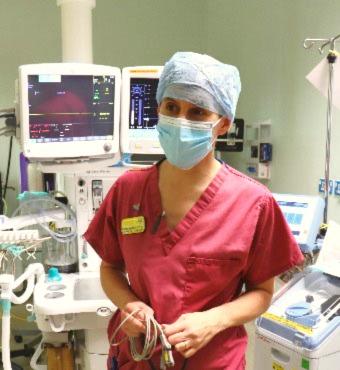
As part of Plastic Free July we are highlighting staff members and teams at North Bristol NHS Trust (NBT) doing things a little differently in order to reduce our plastic waste.
Operating theatres are energy and resource-intensive environments and can account for as much as 25% of a hospital’s total carbon footprint.
Staff in NBT’s operating theatres have managed to cultivate a strong culture of sustainability through the sharing of knowledge, building relationships with ‘green’ suppliers, providing feedback to suppliers with less sustainable practices, and donating plastic waste to community organisations to be reused.
“We have quite a strong eco-conscious team right across theatres,” said Catherine Murray, one of NBT’s Clinical Coordinators for Anaesthetics.
“It’s definitely built into the culture of our department. Most people are pretty keen to get on board with eco projects, certainly in theatres. We have a green tips email that gets sent around by one of the anaesthetic consultants, and that's not exclusively restricted to work-related things.”
“People will share tips about what they've done at home to reduce single use plastic if they found an eco-friendly alternative product…those kinds of things are shared along with just general tips of how to live a more planet friendly lifestyle.”
Catherine says she has always been a strong advocate for finding more sustainable ways of working. Some of the changes her team have made include:
- Working towards reusable boxes instead of single-use plastic bags for returning patients’ clothing after surgery.
- Donating plastic waste to Bristol’s Children’s Scrapstore to be used for arts and crafts.
- Using resterilised ‘single use’ surgical instruments.
- Switching to a face mask supplier that uses less packaging.
- Trialling a scavenging system to stop anaesthetic gases being pumped out into the atmosphere.

Catherine has noticed a definite shift towards a more sustainable mindset in healthcare in the past few years, partly driven by colleagues attending industry conferences and bringing back knowledge and ideas.
“It's certainly picked up momentum in the last five plus years and because there's more and more options coming in all the time. And it's just about kind of people going to conferences and hearing ‘Oh, this department's doing this thing.’”
She also attributes it to NBT having a strong culture of people speaking up when they have new ideas.
“If anybody notices something that comes as packaging or as part of a kit that never gets used, somebody will say ‘This is ridiculous. We're throwing away this item, whatever it is, all the time. What can we do with it?’ Whether that is asking the company to take it out or finding a repurpose for it, either within the hospital or at home.”
Learn more about NBT's Sustainable Development Policy.
